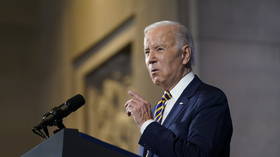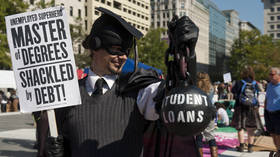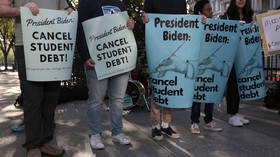Joe Biden has no serious plan for the student loan crisis

US President Joe Biden on Sunday tweeted, “Providing student loan debt relief to hardworking borrowers is necessary to help them recover from the economic harms of the pandemic. That’s why in our bipartisan budget agreement, I fought to keep it in place.”
It was met with the usual partisan responses of folks thanking Biden for helping them or, alternatively, criticizing him for giving handouts to adults who should be more financially responsible.
That’s pretty typical and about what you’d expect around the student loan debate in the US. But the problem is that it’s misleading. The so-called Fiscal Responsibility Act of 2023 only includes a small $6 million loan forgiveness program for a subsection of eligible individuals. Meanwhile payments will resume for the vast majority of borrowers and the $1.78 trillion they owe 60 days after June 30, following a three-year-long emergency freeze because of the Covid-19 pandemic. As The Debt Collective describes, this was lauded by one of the most predatory lenders, SoFi, to the point that they dropped their lawsuit against the US Department of Education.
In effect, Biden gave a win to big financial institutions while forgiving roughly 0.0000034% of the country’s total student debt. You may be thinking to yourself, as some folks who commented on Biden’s tweet, that borrowers should resume their payments since they signed for the loans and ought to pay them like proper adults. Discounting the fact that most developed countries have taxpayer-funded higher education and therefore student debt isn’t a major problem, this is detrimental to the US and global economy.
You may also be thinking that people not paying their debt would be bad for the economy and that Biden’s program that would wipe up to $20,000 in debt for many federal loan borrowers could pose a systemic risk. First of all, the fact that people haven’t been paying their monthly payments for over three years immediately disproves this. But more importantly, this is simplistic thinking that discounts just how fundamentally broken and corrupt the US financial system is.
The important part is this: due to the outrageous cost of living in the US, skyrocketing rent prices and soaring inflation, most borrowers couldn’t pay off their student loans anyway. A Morning Consult poll in November of last year found that 59% of borrowers wouldn’t be able to afford their payments when the federal student debt freeze is lifted, meaning they could default on their loans. And even people like the aforementioned Debt Collective are organizing to orchestrate a student debt strike.
Therefore, it’s not an issue of whether people should or shouldn’t pay their loans, many just can’t. The problem with this, for the broader financial market, is that the financial market trades, as it has for decades, what’s called Student Loan Backed Securities (SLABS). These are a kind of security that is collateralized by student loans, meaning investors are essentially gambling on whether people can pay their loans or not. Since most people have student loans backed by the federal government, forgiving them would not create any kind of systemic risk for the financial market in this way.
The major problem is with private loans, which about 3.6 million people have. These particular loans, even though the payments have been frozen, have accrued interest in forbearance. Most people with frozen payments haven’t paid them, which means they now owe more than they did before the freeze and the payments will be more onerous when it ends at the end of August. This creates a serious risk that people with private loans will default and create a cascading effect in the market through SLABS.
You can think of this in a way similar to the 2008 financial crisis. During that time, the securitization of home mortgages (mortgage-backed securities) played into excessive risk-taking in an already highly deregulated financial market. When the housing market bubble burst and folks defaulted on their mortgages, Wall Street investors were left holding the bag on these mortgage-backed securities and it spiraled from there, wrecking the global economy.
To be fair, SLABS have fallen from the market in recent years as the freeze has been in effect. But they could become more popular again and, more importantly, smart investors will probably short them based on the data that clearly indicates many borrowers will default, which is a major problem. Wall Street investors shorting major financial institutions have been instrumental in some of the largest banking crashes in US history in recent months, and they were equally important in fueling the 2008 financial crash too.
This, of course, has nothing to do with any personal moral failings by individual investors but rather a failure of the federal government to foresee this possibility and regulate what kind of securities can be traded. Other countries and blocs, like the EU and China, surely have risky financial products such as mortgage-backed securities – but they are far more regulated and nowhere near as developed as in the US. The US stands alone in dealing with SLABS, both because of its lack of universal higher education and its lax financial environment.
One could easily turn the ‘be an adult’ argument, often leveled at student loan borrowers, back on investors: You took a risk by granting an unpayable loan so you should live with the consequences. That’s a nice ‘gotcha’, but it’s completely useless in terms of ameliorating the economic effects of a systemic issue in the financial market. In addition to providing some answer to private loan holders – and it appears the Department of Education has none whatsoever – the Biden administration really needs a solution for the fact that many investors will wisely bet against these private loans that are virtually certain to default.
This probably won’t happen based on what we can see with the Fed and the administration’s whack-a-mole approach to large bank crashes. Their non-existent solutions to a very obvious commercial real estate bubble in an impending death spiral, and Biden being the perennial friend of creditors are also clear.
Finally, as far as the federal student loan forgiveness program Biden has put on the table, it is almost certain the Supreme Court will unload every bit of legal revisionism and corporate activist jurisprudence at it. And his track record heavily implies he would support this.
The statements, views and opinions expressed in this column are solely those of the author and do not necessarily represent those of RT.
















